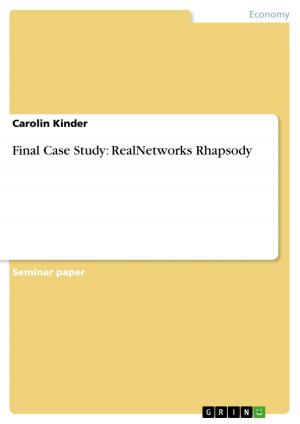| Author: | Florian Schumacher | ISBN: | 9783640137510 |
| Publisher: | GRIN Publishing | Publication: | August 13, 2008 |
| Imprint: | GRIN Publishing | Language: | English |
| Author: | Florian Schumacher |
| ISBN: | 9783640137510 |
| Publisher: | GRIN Publishing |
| Publication: | August 13, 2008 |
| Imprint: | GRIN Publishing |
| Language: | English |
Essay from the year 2004 in the subject English Language and Literature Studies - Other, grade: 1,5, University of Wisconsin - La Crosse - USA (University of Wisconsin - La Crosse, USA; Anglistik), course: Western Literature, 3 entries in the bibliography, language: English, abstract: The basis of my paper is a comparison between communism the way it is supposed to be, as defined by Karl Marx and Frederick Engels in the Communist Manifesto, and the way communism looks in reality, as it is described in Milan Kundera's Book of Laughter and Forgetting. At the beginning of this paper I will summarize the main ideas regarding communism both of Marx and of Kundera, and afterwards I will compare those two points of view. In the first part of his Communist Manifesto, Marx says that the world is ruled by the bourgeoisie and its capitalist attitude. With his manifesto, he wants to encourage the Proletariat of the world to unite and fight side by side against capitalism. He thinks that the main task of the communist party is to point out the common interest of the entire Proletariat and to represent the interests of the movement as a whole. The main theory of communism is - according to Marx - the abolition of all private property, and in order to achieve that, the party is even willing to sacrifice some parts of the individual freedom (like abolishing families) as a part of the process to free the Proletariat from its oppressors. Marx even admits that communism wants to abolish the eternal truths like freedom and justice, as well as religion and morality. As some of the most important measures to make communism possible he names heavy income taxes, abolition of property in land and, what is very important considering my paper, the centralization of the means of communication and transportation in the hands of the state. Being able to control the means of communication is an important factor for a state to control and manipulate its population - like the example of CNN and the manipulative media in the United States shows every day.
Essay from the year 2004 in the subject English Language and Literature Studies - Other, grade: 1,5, University of Wisconsin - La Crosse - USA (University of Wisconsin - La Crosse, USA; Anglistik), course: Western Literature, 3 entries in the bibliography, language: English, abstract: The basis of my paper is a comparison between communism the way it is supposed to be, as defined by Karl Marx and Frederick Engels in the Communist Manifesto, and the way communism looks in reality, as it is described in Milan Kundera's Book of Laughter and Forgetting. At the beginning of this paper I will summarize the main ideas regarding communism both of Marx and of Kundera, and afterwards I will compare those two points of view. In the first part of his Communist Manifesto, Marx says that the world is ruled by the bourgeoisie and its capitalist attitude. With his manifesto, he wants to encourage the Proletariat of the world to unite and fight side by side against capitalism. He thinks that the main task of the communist party is to point out the common interest of the entire Proletariat and to represent the interests of the movement as a whole. The main theory of communism is - according to Marx - the abolition of all private property, and in order to achieve that, the party is even willing to sacrifice some parts of the individual freedom (like abolishing families) as a part of the process to free the Proletariat from its oppressors. Marx even admits that communism wants to abolish the eternal truths like freedom and justice, as well as religion and morality. As some of the most important measures to make communism possible he names heavy income taxes, abolition of property in land and, what is very important considering my paper, the centralization of the means of communication and transportation in the hands of the state. Being able to control the means of communication is an important factor for a state to control and manipulate its population - like the example of CNN and the manipulative media in the United States shows every day.















